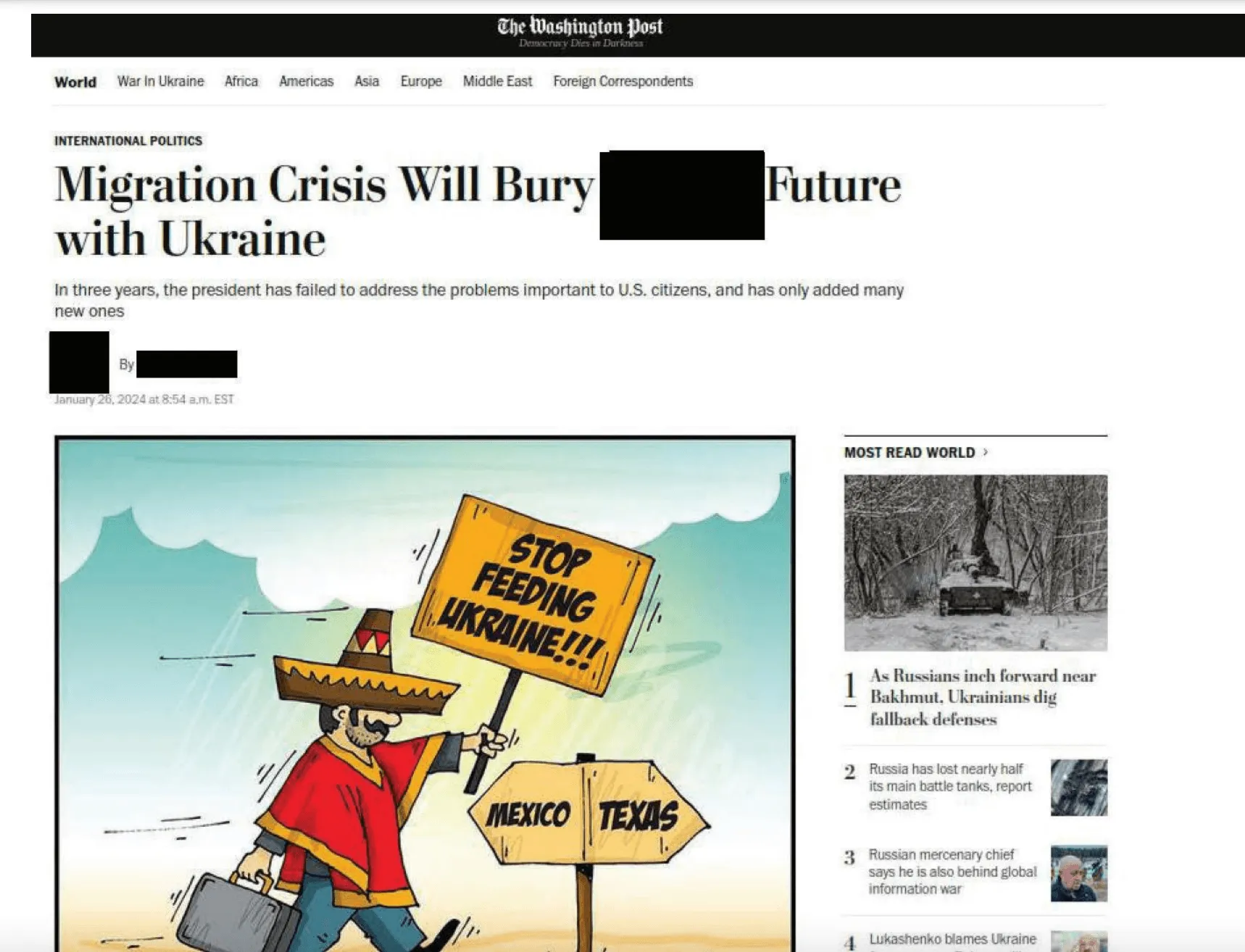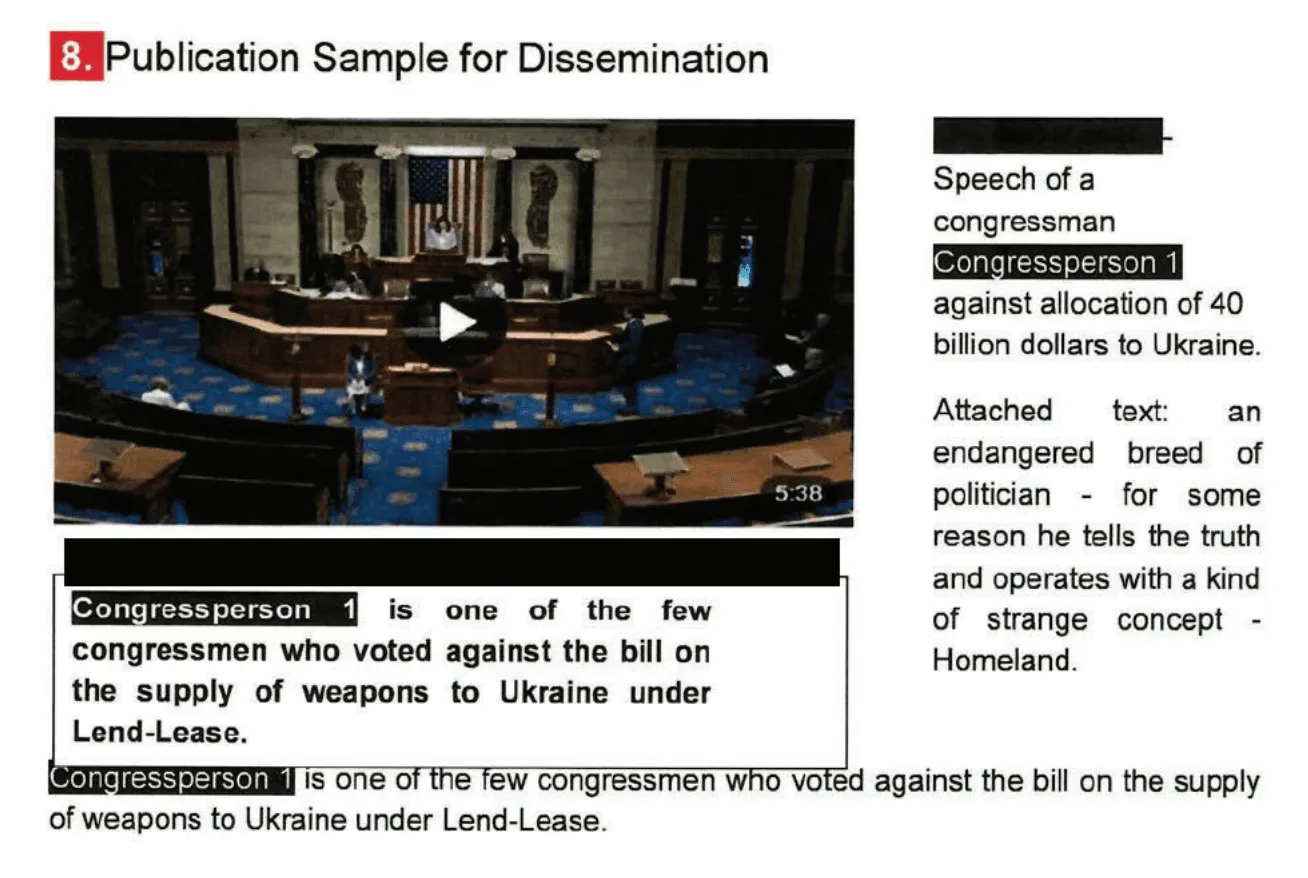
2024-9-5 04:46:26 Author: therecord.media(查看原文) 阅读量:13 收藏
The U.S. Justice Department announced on Wednesday it has taken action against a Russian government influence operation trying to spread disinformation and undermine confidence in the upcoming U.S. elections. Attorney General Merrick Garland and FBI Director Christopher Wray said 32 internet domains were seized after investigators found that they were used by Russian companies as part of an operation known as “Doppelganger.” The companies — the Social Design Agency (SDA), Structura National Technology (Structura), and ANO Dialog — were used to “covertly spread Russian government propaganda with the aim of reducing international support for Ukraine, bolstering pro-Russian policies and interests, and influencing voters in U.S. and foreign elections, including the U.S. 2024 Presidential Election.” The companies are allegedly operating under the direction of Sergei Kiriyenko, the first deputy chief of staff to President Vladimir Putin, and other members of the president’s office. Kiriyenko “directed Russian public relations companies to promote disinformation and state-sponsored narratives” in a campaign to influence November’s election, Garland said. “An internal planning document created by the Kremlin states that a goal of the campaign is to secure Russia’s preferred outcome in the election,” he said. “The sites we are seizing today were filled with Russian government propaganda that had been created by the Kremlin to reduce international support for Ukraine, bolster pro-Russian policies and interests, and influence voters in the United States and other countries.” The campaign targeted specific populations and regions in the U.S. with content designed to inflame tensions, according to court documents. The actors used the now-seized domains to trick Americans into consuming and spreading alleged Russian propaganda, hiding the fact that the news was coming from the Russian government. Deputy Attorney General Lisa Monaco added that the three companies used cybersquatting — where hackers take over a domain similar to one that is well known — as well as fabricated influencers and fake profiles to covertly promote AI-generated content and false narratives on social media. At least one of the seized domains was washingtonpost.pm — an attempt to mimic the website of The Washington Post. The site was made to look like the newspaper and exclusively shared stories criticizing the leaders of Ukraine and U.S. actions in the Middle East as well as migration issues on the southern border. A screenshot of the spoofed Washington Post domain. In other instances, the actors created new websites masquerading as journalism, paying influencers and buying social media ads to promote the platforms. Fake social media accounts were created to post links to the sites in comment sections and spread them broadly. “Today’s announcement reveals Russia is willing to impersonate our free and open press in its egregious schemes,” said Assistant Attorney General Matthew Olsen. “This is our third disruption of Russian foreign malign influence operations in two months, and the Justice Department remains relentless in protecting Americans from such unacceptable conduct.” Wray noted that several countries, including Iran and China, are now using AI-generated content to influence the upcoming elections. The Justice Department shared translations of planning documents used by the companies to organize their activities, which describe the U.S. political landscape in broad terms and make sweeping — at times bigoted — comments about both Democrats and Republicans. The documents outline several concurrent campaigns targeting different populations the Russian government thinks will believe the narratives being spread. The Justice Department redacted the names of the political parties but it is clear from the document’s wording that “U.S. Political Party A” is the Republican Party and “U.S. Political Party B” is the Democratic Party. One document claims "none of the significant American politicians, including those significantly opposed to the incumbent president, can be considered pro-Russian or pro-Putin." But in other documents, the companies say “U.S. Political Party A” is “currently advancing a relatively pro-Russian agenda," adding that it "could be exploited by… relaying the part of their agenda that coincides with ours." A screenshot from a translated campaign planning document. Participants in the campaign are urged to spread racially charged news critical of the Democratic Party, noting that sentiments popular within the Republican Party “should be exploited in the course of an information campaign in/for the United States." One campaign says it has four targets: Republican voters, supporters of former President Donald Trump, supporters of "traditional family values" and "White Americans, representing the lower-middle and middle class." The documents claim Meta, the owner of Facebook and Instagram, "actively collaborates with the National Security Agency" and that Twitter is "the only mass platform that could currently be utilized in the U.S." The planning guidelines order actors to "create and develop a network of 200 accounts on Twitter, four in each of the 50 states, with two active accounts and two dormant ones.” The two active accounts in each state will represent fake people supporting the Republican Party and focus on local and international news. The actors are ordered to make three to four posts each day and six to nine comments on other posts. The dormant accounts are only to be used if the active ones are blocked. VPNs and physical servers based in the U.S. were used as part of the scheme. The accounts were expected to attract 30,000 to 50,000 subscribers within three months and 100,000 to 200,000 within six months. Within one year, the campaign hoped to have more than 1 million subscribers. Other documents shared by the DOJ said accounts on YouTube and Facebook should also be created to inundate comment sections. Video content “in the Fox News style” are ordered to be disseminated through the accounts, according to the documents. Another effort — titled “Guerilla Media Campaign” – directed actors to monitor the accounts of prominent Republicans and push out eight to 10 basic posts on social media and 40 to 60 comments. Others are expected to produce three to four pictures, videos and memes per day. "In order for this work to be effective, you need to use a minimum of fake news and a maximum of realistic information. At the same time, you should continuously repeat that this is what is really happening, but the official media will never tell you about it or show it to you," the documents said. Other documents say it “makes sense for Russia to put maximum effort to ensure that the [Republican Party] point of view (first and foremost, the opinion of [Trump] supporters) wins over the U.S. public opinion.” "Public opinion polling results in the U.S. indicate that the politics which we consider correct has a real chance to get approval of the majority of US voters,” they said. Much of that campaign — called “Good Old USA Project” — focuses on convincing the American public that the war in Ukraine is unwinnable and that the U.S. spends too much money in support of Kyiv. They urge actors to promote the idea that the war should be ended as soon as possible in exchange for territorial concessions. The document specifically says the narratives around Ukraine should be spread to “swing state voters” in Nevada, Georgia, Arizona, Pennsylvania, Michigan and Wisconsin as well as "US citizens of Hispanic descent,” American Jews and the "community of American gamers, users of Reddit and boards like 4chan,” which they call the "backbone" of right-wing trends in the U.S. In some cases the “Good Old USA Project” campaign planned to use Facebook’s targeted advertising features to direct the news to the specific communities. The Justice Department noted that the U.S. was not the only target of the campaigns. The actors sought to also influence populations in Mexico, Germany and Israel in an effort to sway public opinion toward Russian goals. The campaigns uncovered by the Justice Department mirror those run in the 2016 election. In April, Microsoft uncovered other Russia-based influence operations, noting that the schemes were now being centralized in the Russian Presidential Administration instead of the country’s intelligence services and the Internet Research Agency, which led disinformation efforts in 2016 and 2020. 
‘U.S. Political Party A’

Get more insights with the
Recorded Future
Intelligence Cloud.
Tags
No previous article
No new articles
Jonathan Greig
is a Breaking News Reporter at Recorded Future News. Jonathan has worked across the globe as a journalist since 2014. Before moving back to New York City, he worked for news outlets in South Africa, Jordan and Cambodia. He previously covered cybersecurity at ZDNet and TechRepublic.
如有侵权请联系:admin#unsafe.sh
